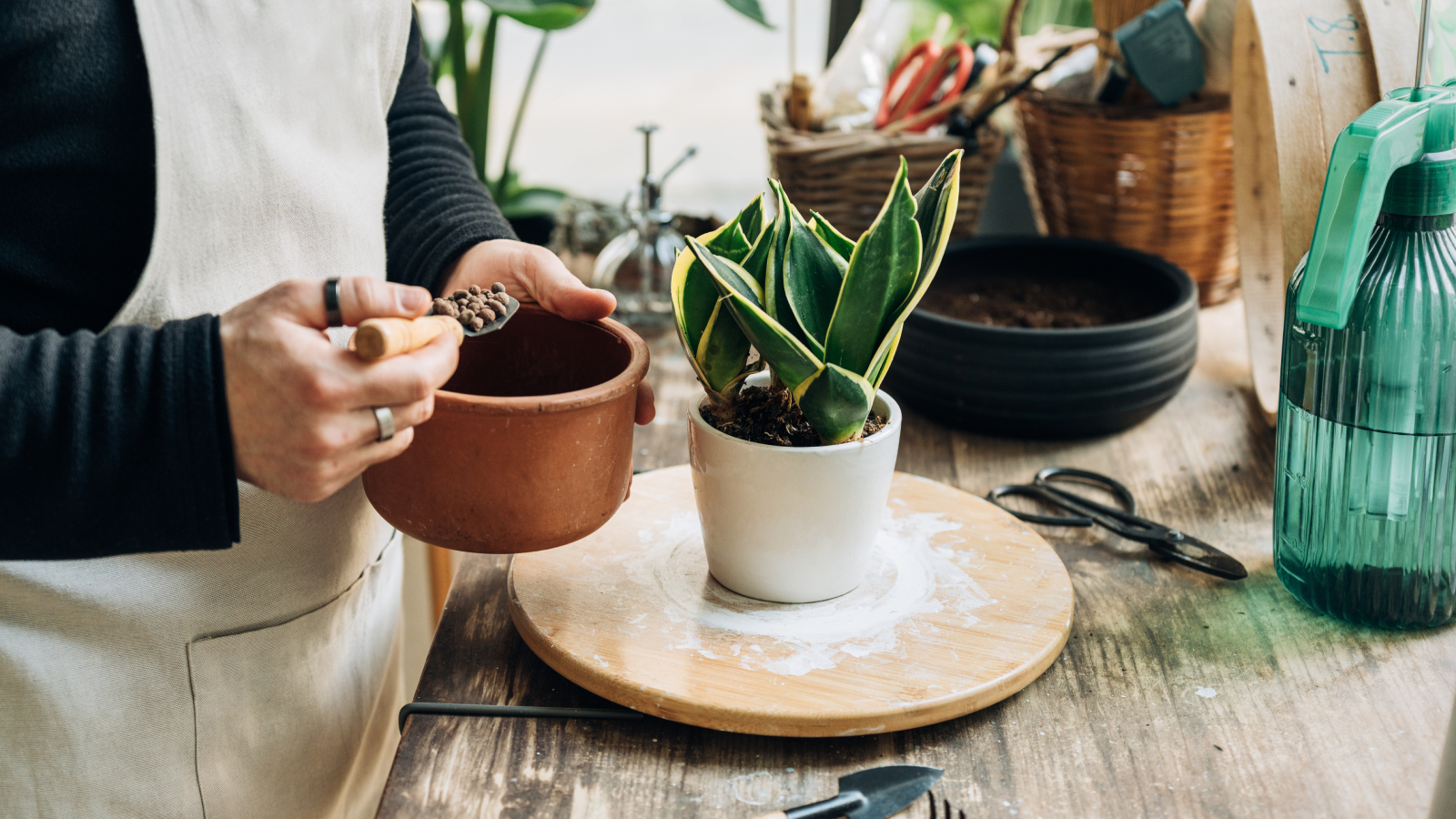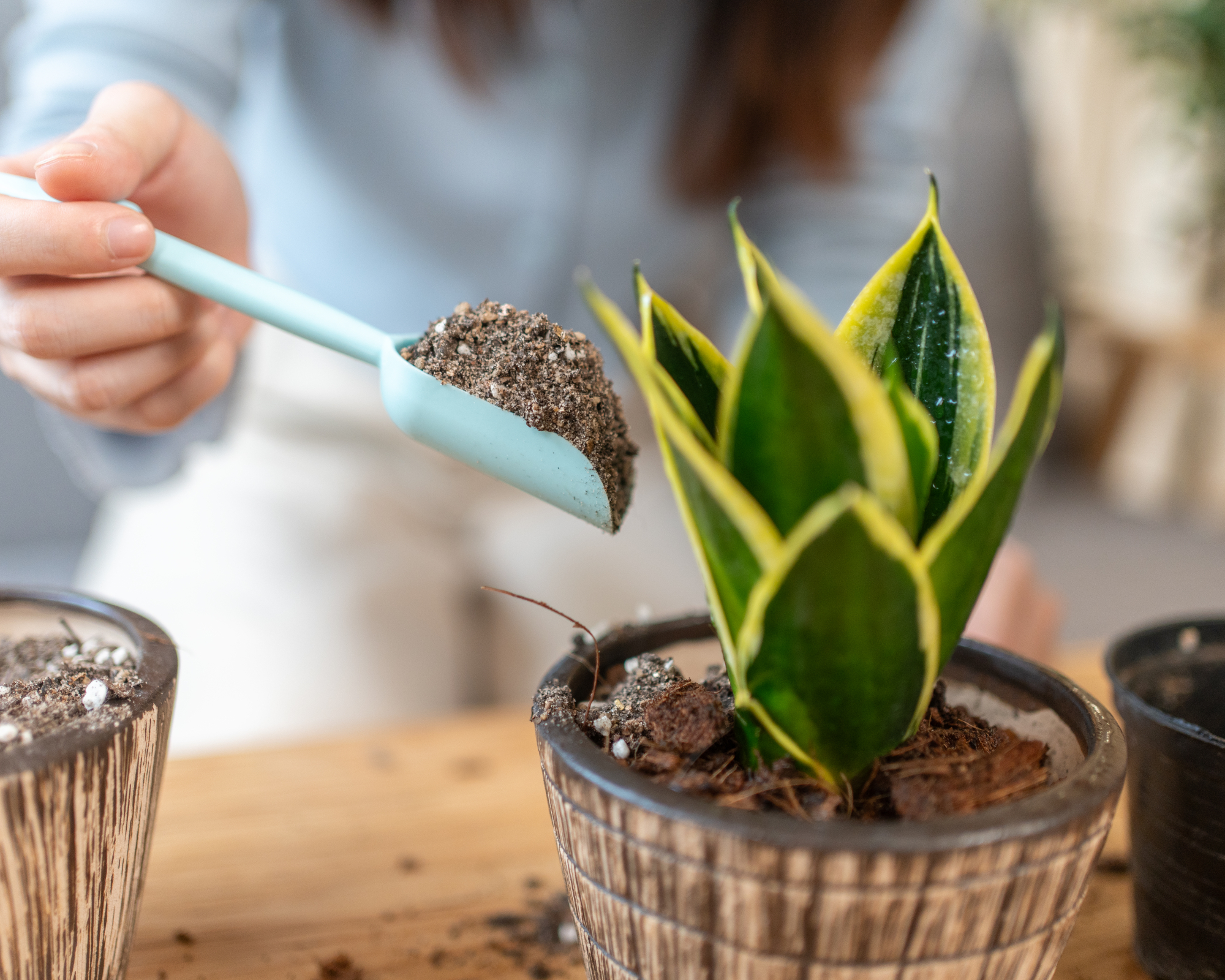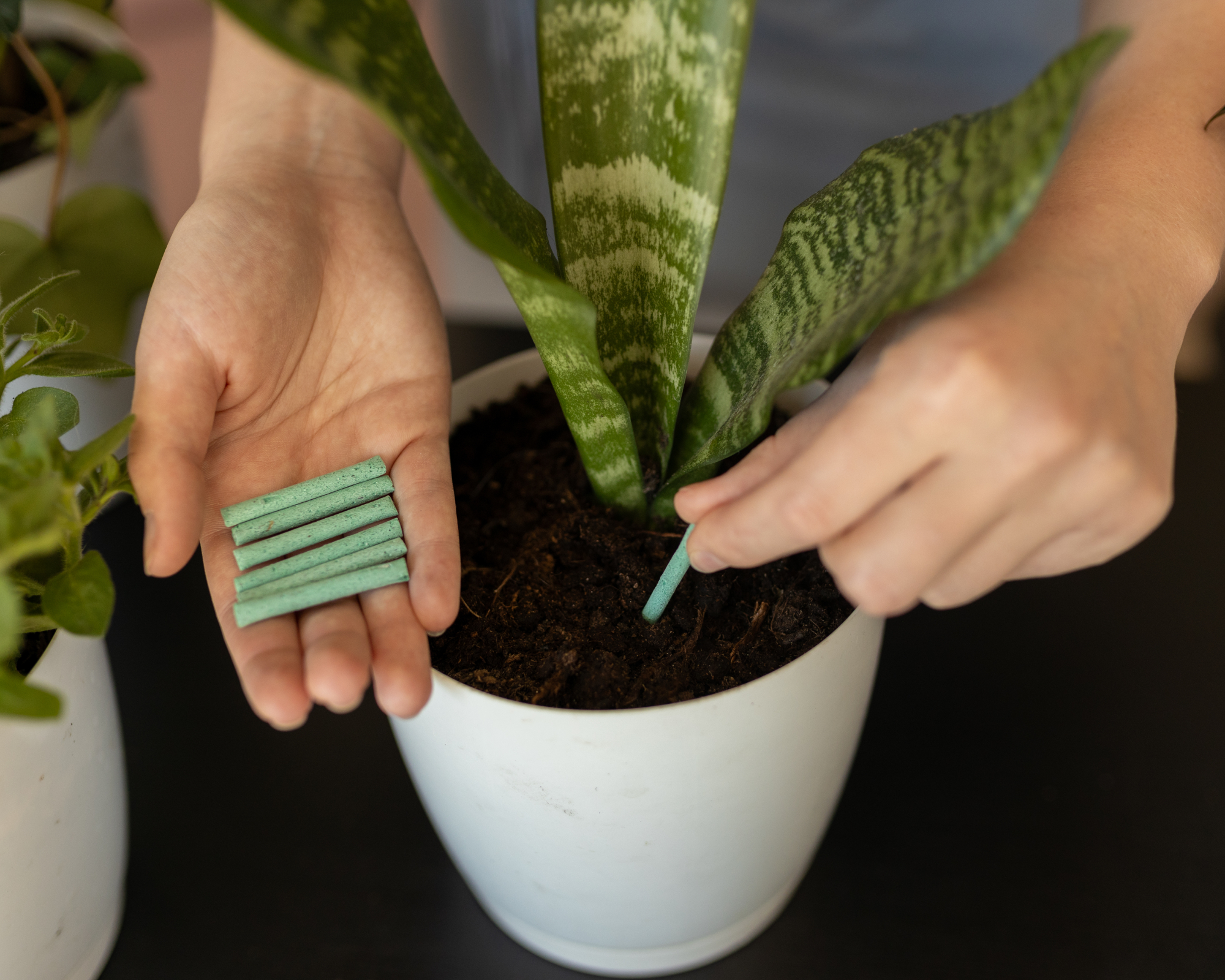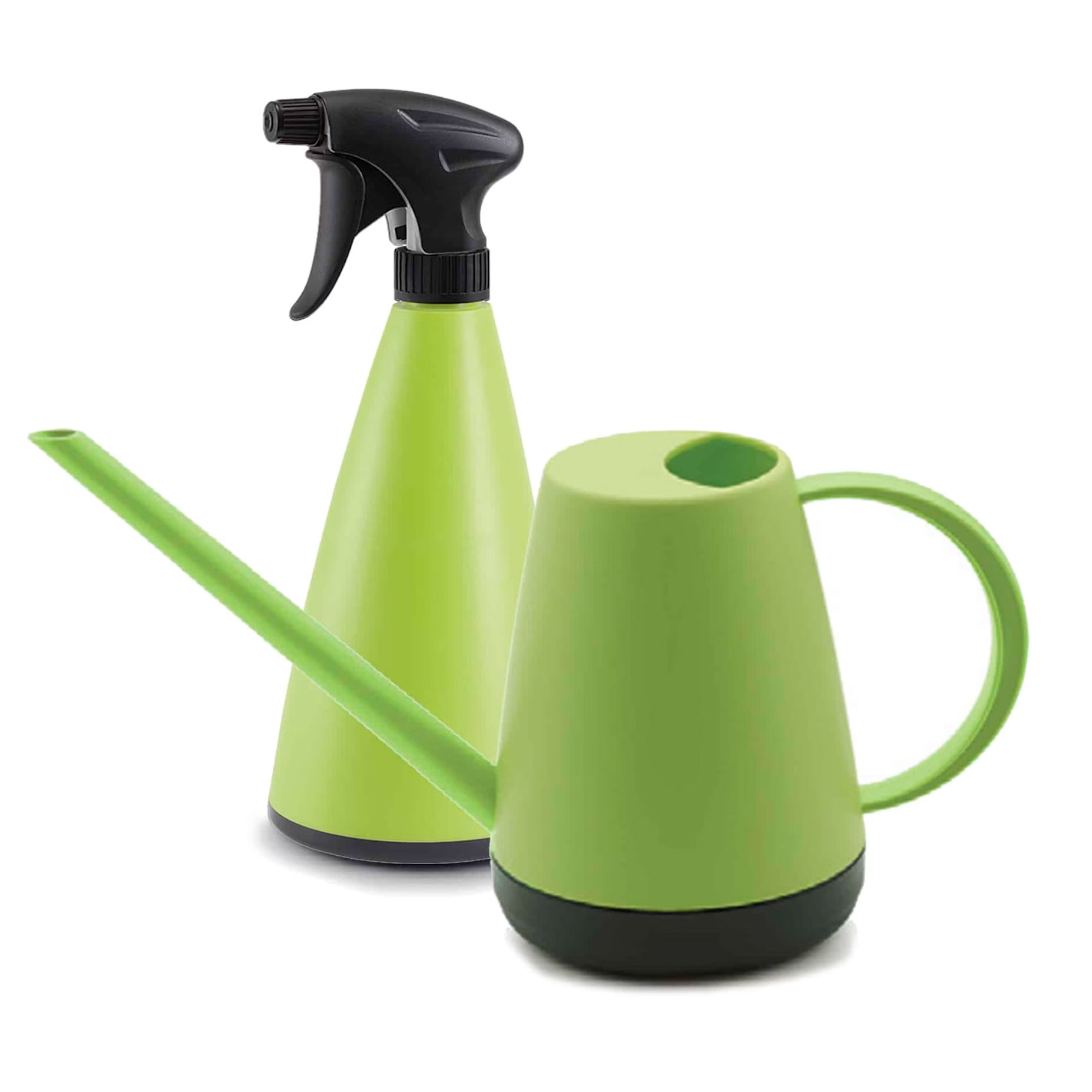Ultimate Snake Plant Fertilizer Guide For Lush, Healthy Houseplants
Snake plants are pretty easy-going houseplants, but they might still benefit from fertilizing. Learn how and when to fertilize for happy and healthy plants.

Amy Draiss

If you are caring for one of these vertically appealing succulents, you may be curious about snake plant fertilizer. Do snake plants need fertilizer? In their native range, tropical West and West Central Africa, they thrive in dry, rocky areas.
These environments are generally almost devoid of nutrients, which means the plant is adapted to relatively low nutrient availability. And growing snake plants is generally considered to be an easy, low-maintenance houseplant endeavor.
But like any plant, especially those in the captivity of a container, snake plants do have nutritional needs that must be supplemented. Their long, pointed leaves require nitrogen, chiefly, for health and growth.
Do Snake Plants Need Fertilizer?
Snake plants are unique foliage, grown for their erect, slightly rigid, but occasionally arching, thick, succulent leaves. These are variegated with lighter shades of green, gray green, and some yellow.
As with any plant, snake plants require a supply of nitrogen, phosphorus, and potassium. These are the macronutrients listed as a ratio on fertilizer packets as NPK. Nitrogen is good for foliar growth, color, and health. Phosphorus helps with root, fruit, and seed production. Potassium is important to photosynthesis and reproduction.
Snake plants do flower but it is rare in the home setting. They will not need a fertilizer high in phosphorus, but they do need a little bit to help with root establishment.
Best Fertilizer For Snake Plants

Snake plants are super stoic in regards to site, soil, water, and nutrient density. They are well adapted to harsh conditions and rarely need feeding. But when they do, applications of a balanced fertilizer such as 10-10-10, will provide all the nutrients the plant requires.
Sign up for the Gardening Know How newsletter today and receive a free copy of our e-book "How to Grow Delicious Tomatoes".
A standard houseplant fertilizer diluted by half will fulfill the plant’s needs. You could also invest in a succulent formula, especially made for this group of plants. These types of fertilizers have low rations of the macronutrients. A succulent formula will usually have a lower 1 number which is nitrogen.
A good homemade succulent fertilizer is a mixture of pulverized egg shells, dried and crushed banana peels, coffee grounds, and well diluted fish emulsion. The plant also responds well to a top dress of compost.
How Often To Fertilize Snake Plants

Succulents go into a dormant state starting fall and lasting through winter. The lower daylight hours signal to the plant that it is time to take a break from growing. During this dormant stage, snake plants should not be fertilized.
Once the days begin to get longer, the plant will come out of its hibernation and start new cell activity. This is generally in late winter and early spring and is when you should start fertilizer for snake plants.
How often to fertilize snake plant? The frequency depends upon the dilution of the formula you use and the type. If you are using a time release granular formula, feed the plant once in spring. Similarly, feed once in the spring if you use plant spikes. These will both break down gradually and slowly release nutrients over the growing months.
On average, a liquid food should be diluted by half and applied once per month in the growing season.

This watering can and sprayer duo will help you to water and fertilize your houseplants with ease. Find in the Gardening Know How Shop.
How To Fertilize Snake Plants
Liquid foods should be watered directly into the root zone. Take care not to get the leaves wet. Fertilizer plant spikes are pushed into the soil near the root zone and should be followed by water. Granular foods are scratched lightly into the soil and followed by water.
If you are making a homemade liquid fertilizer mixture such as the one above, suspend the dry ingredients in water and add a small amount of the emulsion. Water this into the root zone.
Compost may be spread over the top 1 inch (2.54 cm.) of the soil and will gradually break down and release nutrients. Try to keep the compost off the bases of the leaves.
Frequently Asked Questions
Are used coffee grounds good for snake plants?
Many organic kitchen scraps are useful for plant nutrients and as part of homemade fertilizers. Coffee grounds contain quite a bit of nitrogen, but also potassium, phosphorus and micronutrients.
Since Mother-in-law’s tongue is a foliage plant, the nitrogen will keep the leaves at their best. Trace nutrients include calcium, magnesium, copper, zinc, iron, and boron, all nutrients necessary in small amounts for plant health.
Can I use succulent fertilizer on a snake plant?
Snake plants are succulents. They have the thick, waxy cuticle and dense leaves characteristic of most desert species of succulent. They are also remarkably drought tolerant. Succulent fertilizers are ideal for snake plants.
Should you fertilize divisions?
Over time, snake plants will produce new rosettes that can be divided away and planted up separately. These may be fertilized following the same schedule as the parent plant. The first feeding should be diluted again so that it is gentle and nutrients are lightly present but soluble. Thereafter, continue with once per month fertilizing during the growing season.
Should you fertilize to encourage a bloom?
Snake plants can bloom in their native range. They produce whitish green, aromatic blooms. In a houseplant situation, such a bloom is rare. If you wish to encourage the plant to flower, treat it badly. Essentially, let it become pot bound, fail to feed it, keep it quite dry, and keep it in bright light. Do not fertilize the plant if you want blooms, not even with a high phosphorus formula. The only way to get flowers is to stress the plant severely.
This article features products available from third-party vendors in the Gardening Know How Shop.

Bonnie Grant is a professional landscaper with a Certification in Urban Gardening. She has been gardening and writing for 15 years. A former professional chef, she has a passion for edible landscaping.
- Amy DraissDigital Community Manager